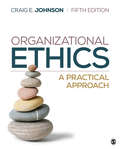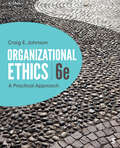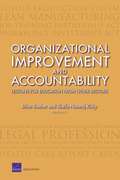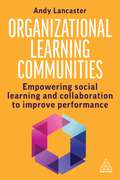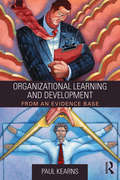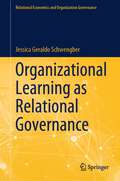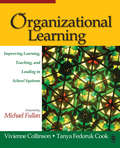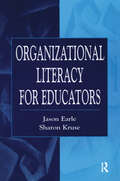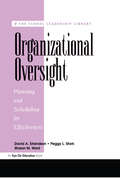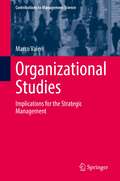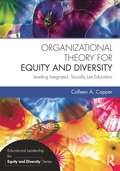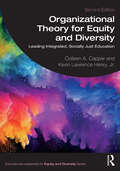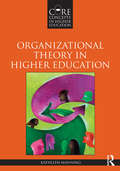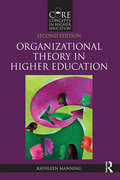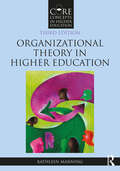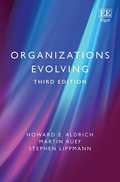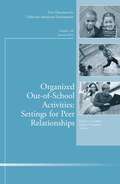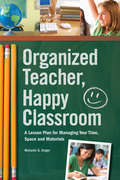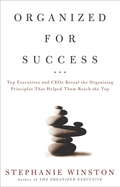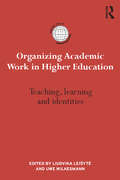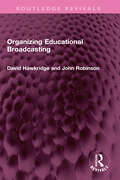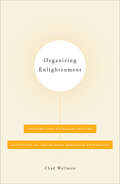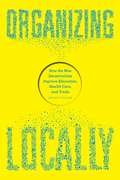- Table View
- List View
Organizational Ethics: A Practical Approach
by Craig E. JohnsonWith an interdisciplinary focus, Organizational Ethics equips students with the knowledge and skills they need to make a positive impact in a variety of workplaces. Author Craig E. Johnson builds the text around interdependent levels of organizational behavior, examining ethics at the individual, group, and organizational levels. Self-assessments, reflection features, and application projects give students ample opportunity to practice their ethical reasoning abilities. The Fifth Edition includes over 25 new case studies on current events and prominent figures, 24 new self-assessments, and new discussions on topics such as cross-cultural ethical conflict and organizational virtue.
Organizational Ethics: A Practical Approach
by Craig E. JohnsonWith an interdisciplinary focus, Organizational Ethics equips students with the knowledge and skills they need to make a positive impact in a variety of workplaces. Author Craig E. Johnson builds the text around interdependent levels of organizational behavior, examining ethics at the individual, group, and organizational levels. Self-assessments, reflection features, and application projects give students ample opportunity to practice their ethical reasoning abilities. The Fifth Edition includes over 25 new case studies on current events and prominent figures, 24 new self-assessments, and new discussions on topics such as cross-cultural ethical conflict and organizational virtue.
Organizational Ethics: A Practical Approach
by Craig E. JohnsonOrganizational Ethics: A Practical Approach, Sixth Edition provides readers with opportunities to apply ethical principles and practices in a variety of settings through self-assessments, analyses, projects, and discussion. Bestselling author, Craig E. Johnson, shows how we can develop our ethical competence, just as we develop our abilities to manage or oversee operations.
Organizational Ethics: A Practical Approach
by Craig E. JohnsonOrganizational Ethics: A Practical Approach, Sixth Edition provides readers with opportunities to apply ethical principles and practices in a variety of settings through self-assessments, analyses, projects, and discussion. Bestselling author, Craig E. Johnson, shows how we can develop our ethical competence, just as we develop our abilities to manage or oversee operations.
Organizational Improvement and Accountability
by Brian M. Stecher Sheila Nataraj Kirby Heather Barney Marc Chow Marjorie L. PearsonExamines five accountability models--two from the manufacturing sector; a performance incentive model used in the evaluation of job training programs for the poor; accountability in the legal sector; and accountability in health care as shown by clinical practice guidelines, use of statistical risk-adjustment methods, and the public reporting of health performance measures. The authors summarize the models' effectiveness and draw lessons for implementing the No Child Left Behind Act.
Organizational Learning Communities: Empowering Social Learning and Collaboration to Improve Performance
by Andy LancasterLearning communities transform organizations through sharing knowledge, spearheading practice, solving problems, seeding innovation and supercharging development. So how can you develop a culture of learning in your organization? Organizational Learning Communities answers this question and explains how and why this approach can improve individual employee performance and drive overall business results. Written by a leading voice in the learning profession, this book contains everything that Learning and Development (L&D) practitioners need to know to successfully embed learning communities in their organizations. Following the 7Cs model of Cause, Culture, Conditions, Cadence, Content, Contributions and Credit, the book establishes the key factors that underpin thriving learning communities as well as the benefits of social and collaborative learning in the company. This practical guide establishes strategies to drive community impact and report success to stakeholders, drawing widely on evidence-based research and real-world examples. Each chapter ends with reflective questions to support transfer to the reader's context. This is essential reading for those involved in facilitating learning communities, or planning on pioneering one, to empower their organization's productivity and performance.
Organizational Learning and Development: From an Evidence Base
by Paul KearnsIt is now widely accepted that organizational maturity is dependent on being able to reorganize on a continuous basis and learn faster and more effectively than your competitors. Organizations that want to be sure they are competing at the highest level need clear indicators that their organizational learning and development capability is fully functional. This new book by Paul Kearns focuses on the need for an evidence-based approach to learning and development, bringing together the author’s extensive knowledge of HRM and organizational learning with new developments in the field. The book demonstrates how evidence evaluation can improve professionalism in organizational design and development, showing that this approach can create value not just for shareholders, but for employees and society as a whole. Organizational Learning and Development: From an Evidence Base is the perfect book for postgraduate students studying on evidence-based HRM courses and for the reflective learning and development practitioner.
Organizational Learning as Relational Governance (Relational Economics and Organization Governance)
by Jessica Geraldo SchwengberThis book critically examines existing organizational learning theories that often center on employees and adopt a neo-classical organizational view. In this book, organizational learning (OL) is conceptualized from a relational governance perspective. Departing from the relational economics approach, it describes organizations as dynamic nexuses of stakeholders' resources and interests, extending beyond conventional intra-organizational contexts to encompass an open systems view. By viewing organizations as independent entities, distinct from individual stakeholders, the author introduces the concept of transactions as the fundamental unit of analysis in organization theory. Stakeholders contribute diverse rationalities, and OL emerges as the process of relationalizing these rationalities, enabling multi-contextual transactions within organizations. This book sheds light on epistemological and ontological challenges in OL literature, such as the OL paradox and anthropomorphism. To address these issues, the author advocates a shift from methodological individualism to methodological relationism, wherein OL becomes a micro-meso-relational process involving both stakeholders and the organization as an entity. Combining conceptual insights with empirical evidence from a multinational company's case study, the book showcases how relational learning can be practically applied in organizations. The findings corroborate the conceptual framework, supporting the notion of organizations as resource-rich nexuses and learning as a comprehensive relational process involving both entities and stakeholders. This book offers an essential contribution to the field. It appeals to scholars and practitioners interested in organizational studies, corporate governance, and relational economics.
Organizational Learning: Improving Learning, Teaching, and Leading in School Systems
by Vivienne Collinson Tanya Fedoruk CookThis innovative book about organizational learning in K–12 settings reshapes the way teachers and administrators think about people, practices, and policies while providing a compelling roadmap for transformation from within today's school systems.
Organizational Literacy for Educators
by Jason Earle Sharon D. KruseTeachers and administrators who understand the "politics" in schools can operate more successfully to facilitate change. This text teaches educators to identify and influence common social patterns that affect their work in school organizations. It combines literature from educational leadership and foundations of education to provide a comprehensive introduction to organizational theories related to schooling. A particularly notable feature is that in addition to traditional bureaucratic and political approaches, there is a substantial focus on recent critical and feminist theories. Extensive use of narrative vignettes makes the theories accessible for prospective and practicing teachers. Practice cases and exercises assist students in applying the theories to their own organization settings. Assuming little prior knowledge of theories about school organizations, this volume is intended as a text for introductory graduate courses, as well as for advanced undergraduate courses, and groups such as site-based management teams and district professional development committees.
Organizational Oversight: Planning and Scheduling for Effectiveness
by David A. Erlandson Sharon Ward Peggy StarkUsing many illustrations, this book takes time to describe a strategy for enhancing organizational trust and productive communication and to demonstrate how these can be used to plan and organize, both in maintaining the school organization and in adpating it for change.
Organizational Studies: Implications for the Strategic Management (Contributions to Management Science)
by Marco ValeriThis book focuses on the discussion and analysis of theory and behavior in organizations in all industries and sectors worldwide. It analyzes the subject of business administration and highlights its evolution, which is closely linked to the frequent and far-reaching changes in the social, economic and technological settings in which it operates.By way of introduction, a historical outline shows how technological progress has sparked profound changes in the economic, social and technological context, making organizations constantly evolving structures. On this basis, the book addresses knowledge management and organizational theories that consider knowledge and training to be companies’ most important resources for facing the substantial challenges posed by the current international context.The book broadens readers’ understanding of the operating principles of business management and their awareness of the structure and implementation of various organizational models. As such, it will be of interest to scholars and professionals in the fields of strategic management and organizational behavior.
Organizational Theory for Equity and Diversity: Leading Integrated, Socially Just Education (Educational Leadership for Equity and Diversity)
by Colleen A. CapperOrganizational Theory for Equity and Diversity covers the full range of organizational theories as applied to educational leadership practice and research, exploring not only traditional perspectives but also critically oriented epistemologies including Critical Race Theory; LatCrit, Asian, Tribal Crit, and Black Crit; Disability Studies theories; feminist theories; Queer Theory, and theories of intersectionality. Each chapter features teaching suggestions, discussion questions, and questions to help aspiring leaders critically analyze their leadership strengths and limitations in order to understand, apply, and integrate theories into practice. This valuable text provides aspiring school leaders and administrators with the theory and tools for creating equitable and diverse schools that are effective and sustainable.
Organizational Theory for Equity and Diversity: Leading Integrated, Socially Just Education (Educational Leadership for Equity and Diversity)
by Colleen A. Capper Kevin Lawrence Henry Jr.Organizational Theory for Equity and Diversity covers the full range of organizational theories as applied to educational leadership practice and research, exploring not only traditional perspectives but also critically oriented epistemologies, including Critical Race Theory; LatCrit, Asian, Tribal Crit, and Black Crit; Disability Studies theories; feminist theories; Queer Theory, and theories of intersectionality. Each chapter features teaching suggestions, discussion questions, and questions to help aspiring leaders critically analyze their leadership strengths and limitations in order to understand, apply, and integrate theories into practice. This new revised second edition includes updated coverage of the latest epistemological literature, expanded applications to practice, and a revision of the popular Identity Development Inventory. This valuable text provides aspiring school leaders and administrators with the theory and tools for creating equitable and diverse schools that are effective and sustainable.
Organizational Theory in Higher Education (Core Concepts in Higher Education)
by Kathleen ManningOrganizational Theory in Higher Education offers a fresh take on the models and lenses through which higher education can be viewed by presenting a full range of organizational theories, from traditional to current. By alternating theory and practice chapters, noted scholar Kathleen Manning vividly illustrates the operations of higher education and its administration. Manning's rich and interdisciplinary treatment enables leaders to gain a full understanding of the perspectives that operate on a college campus and ways to adopt effective practice in the context of new and continuing tensions, contexts, and challenges. Special features include: A unique presentation of each organizational model that includes both a theory chapter for contextual background and a case chapter illustrating the perspective in practice Coverage of eight organizational approaches, both traditional as well as those often excluded from the literature--organized anarchy, collegium, political, cultural, bureaucratic, new science, feminist, and spiritual. Consistent organizational elements across each theoretical chapter--including theoretical foundation, structure, metaphor, characteristics, and strengths and weaknesses--so that readers can better assess appropriate fit of theory to particular situations Questions for Discussion and Recommended Readings assist the reader to make connections to their practice and to develop an in-depth understanding of the organizational theories Organizational Theory in Higher Education provides a clear understanding of how organizational models can be used to elicit the most effective practice and to navigate the complexity of higher education today. This important book is ideal for courses in higher education administration and organizational theory and for administrators and practitioners seeking to gain insight into innovative ways to approach organizations.
Organizational Theory in Higher Education (Core Concepts in Higher Education)
by Kathleen ManningThe second edition of Organizational Theory in Higher Education is a comprehensive and accessible treatment of organizational theory and higher education administration. Noted scholar Kathleen Manning offers a fresh take on the models and lenses through which higher education can be viewed by presenting a full range of organizational theories, from traditional to current. Chapters discuss the disciplinary foundation, structure, metaphor, assumptions, characteristics, and other elements of each organizational theory and conclude with cases highlighting practical applications. Questions for discussion are provided at the end of each chapter and embedded in the cases to assist the reader in making connections to their practice. Manning’s rich, interdisciplinary treatment enables readers to gain a full understanding of the perspectives that operate on a college campus and ways to adopt effective practice in the context of new and continuing tensions, contexts, and challenges. New to this Edition: revised chapters with updated material and new references that reflect current higher education issues including climate change; a new chapter on Institutional Theory, an expanded Feminist and Gendered chapter, and an enhanced Spirituality chapter; new cases throughout to address contemporary issues, and a broader range of institutional types including Historically Black and Hispanic-Serving institutions and 2-year institutions; additional theoretical topics including critical race theory, queer theory, and contemplative practices; updated and enhanced questions for discussion and recommended readings.
Organizational Theory in Higher Education (Core Concepts in Higher Education)
by Kathleen ManningThe third edition of Organizational Theory in Higher Education is a comprehensive and accessible treatment of organizational theory and higher education administration. Through her presentation of both traditional and contemporary organizational theories, noted scholar Kathleen Manning offers a multi-faceted take on the models and lenses through which higher education can be viewed.Chapters discuss the disciplinary foundation, uses, constructs, and assumptions of each organizational theory, including theories often excluded from the literature like organized anarchy, feminist, loosely coupled systems, and queer theory. Each chapter concludes with a case study and discussion questions that encourage the reader to make connections to their practice. Combining theory and practice, Manning’s rich, interdisciplinary treatment enables leaders to gain a fuller understanding of the perspectives that operate on college campuses and ways to enact inclusive, ethical change in the context of new and continuing challenges.New to this Edition: A new chapter on Queer Theory that presents more socially just approaches to institutional organization A new chapter on Loosely Coupled Systems presenting the application of this theory to higher education settings Revised chapters, updated theory, and new coverage that reflect current issues, such as pandemic, crisis responses, and social media Several new and revised case studies to address contemporary issues and align with current realities of higher education Updated and enhanced discussion questions to continue the conversation
Organizations Evolving
by Martin Ruef Howard E. Aldrich Stephen LippmannOrganizations Evolving offers a unique theoretical framework for understanding organizational emergence, persistence, change, and decline. Synthesizing and integrating six paradigmatic approaches to organization theory, this updated and revised third edition presents an evolutionary view that provides a unified understanding of modern organizations and organization theory. Key features of the third edition include: • A sophisticated analytic comparison of six major approaches to understanding modern organizations and their evolution • An interdisciplinary focus, drawing extensively from sociology, social psychology, economics, history, management, and entrepreneurship research • Supplementary materials from academic journals and the popular press, and multi-media resources in an online companion • Extensive case examples that illustrate key evolutionary processes • Study questions designed for extended and reflective learning. Offering key insights and critical learning opportunities, this book is crucial reading for classes covering macro-organizational behavior and the sociology of organizations. Students of management studies and entrepreneurship, particularly those with a focus on organization theory, will also benefit from its interdisciplinary approach.
Organized Out-of-School Activities: Settings for Peer Relationships
by Jennifer A. Fredricks Sandra D. SimpkinsExplore how the peer relationship and extracurricular organized activities--like sports, the arts, and community-based organizations--influence academic functioning, social development, and problem behavior. This volume shows how out-of-school activity offers an ideal context to study peer processes, and to explore both how and why peers matter for organized activity participation. Starting with the theoretical and empirical research on peers and organized activities, it goes on to address several questions including: Does co-participating in an organized activity with your friend improve the quality of the relationship? When do peer relations amplify the benefits of participating and when do they exacerbate negative outcomes? Does participation in organized activities help adolescents manage difficult transition periods? Finally, the volume concludes with a conceptual framework to guide future research on how organized activity characteristics influence peer processes and how these processes within organized activity contexts influence outcomes for adolescents. This is the 140th volume in this series. Its mission is to provide scientific and scholarly presentations on cutting edge issues and concepts in child and adolescent development. Each volume focuses on a specific new direction or research topic and is edited by experts on that topic.
Organized Teacher, Happy Classroom: A Lesson Plan for Managing Your Time, Space and Materials
by Melanie S. UngerBring Out the Best In Your Students Classrooms are busy places full of people, activities, and materials. Keeping them organized can be a challenge, but an organized classroom is essential and allows students and the teacher to fully focus on learning by eliminating distractions. Organized Teacher, Happy Classroom provides practical, proven methods for maintaining an organized classroom throughout the entire school year. Inside you'll find: * Strategies for managing students' papers, curriculum material, and essential paperwork * Time management tips to maximize your instruction time and lesson planning * Organizing systems you can teach your students to improve self reliance and accountability * Checklists for starting and ending the year well organized * Helpful forms and templates you can use in your classroom * Plans for arranging a classroom that promotes positive student participation * Support to simplify your classroom * Efficient storage solutions for all teacher and student materials Whether you teach primary, intermediate, middle school or high school, this book will help you organize your time, paperwork, and classroom spaces.
Organized for Success
by Stephanie WinstonIn this groundbreaking guide, Stephanie Winston explains how she discovered, after more than two decades as a leading organization expert and bestselling author, that senior executives and CEOs seem to possess unique conceptual skills in the areas of time management and organization that enable them to dramatically increase their productivity. Intrigued by this revelation, Winston set out to interview dozens of senior executives in an attempt to better understand the work habits and mental discipline of the supersuccessful, and to quantify their skills and translate them into techniques that will enable managers and ambitious workers at all levels of an organization to develop their own productivity and time management style. The result is a concise, practical, inspiring, and information-filled book that will help any reader get organized for success. Among the strategies that Winston uncovered are two that may surprise—and give heart to—many readers. First: top executives deal very differently with the day-to-day interruptions that cause most of us to lose focus and get sidelined. They view them not as a menacing obstruction to workflow but instead as a means to connect with fellow workers and enable more work to be done. Second: supersuccessful businesspeople do not multitask; they focus their complete attention on each task at hand until it is done, and then move on to the next thing. And they employ powerful delegation strategies to enhance their own productivity and that of their team. Among the many other lessons Winston brings to the reader are insights on how to: • conquer e-mail and paperwork gridlock • run and participate in meetings more effectively • develop your own best productivity and time management style • create techniques to find valuable private time in the middle of a hectic day • use follow-up strategies that ensure you respond to others consistently and complete all necessary tasks Throughout Organized for Success, Winston shares practical tips and tested techniques geared to helping workers and managers at every level to adopt the strategies that highly successful executives have employed on their way up the corporate ladder. Even more, she helps us all—not just those who aspire to the senior executive ranks—to adopt an organized and disciplined mind-set in every aspect of our professional lives. From the Hardcover edition.
Organizing Academic Work in Higher Education: Teaching, learning and identities (International Studies in Higher Education)
by Uwe Wilkesmann Liudvika LeišytėOrganizing Academic Work in Higher Education explores how managers influence teaching, learning and academic identities and how new initiatives in teaching and learning change the organizational structure of universities. By building on organizational studies and higher education studies literatures, Organizing Academic Work in Higher Education offers a unique perspective, presenting empirical evidence from different parts of the world. This edited collection provides a conceptual frame of organizational change in universities in the context of New Public Management reforms and links it to the core activities of teaching and learning. <P><P>Split into four main sections: <li>University from the organizational perspective, <li>Organizing teaching, <li>Organizing learning and <li>Organizing identities, <P><P>this book uses a strong international perspective to provide insights from three continents regarding the major differences in the relationships between the university as an organization and academics. <P><P>It contains highly pertinent, scientifically driven case studies on the role and boundaries of managerial behaviour in universities. It supplies evidence-based knowledge on the effectiveness of management behaviour and tools to university managers and higher education policy-makers worldwide. Academics who aspire to institutionalize their successful academic practices in certain university structures will find this book of particular value. <P><P>Organizing Academic Work in Higher Education will be a vital companion for academic interest in higher education management, transformation of universities, teaching, learning, academic work and identities. Bringing together the study of the organizational transformation in higher education with the study of teaching, learning and academic identity, Organizing Academic Work in Higher Education presents a unique cross-national and cross-regional comparative perspective.
Organizing Educational Broadcasting (Routledge Revivals)
by John Robinson David HawkridgeFirst published in 1982, Organizing Educational Broadcasting provides advice and guidance in organizational and managerial skills for those responsible for the operation of educational broadcasting systems. It is principally designed for those who actually work within educational radio and television systems. They are the people who perhaps stand to gain most by reading about international case studies. In addition, high-level decision-makers, planners and others who are concerned with conceptualizing, planning and implementing new systems, or more likely, modifying old ones, will find much to interest them.
Organizing Enlightenment: Information Overload and the Invention of the Modern Research University
by Chad WellmonThe Enlightenment-era concerns that gave rise to the modern research university can illuminate contemporary debates about knowledge in the digital age.Since its inception, the research university has been the central institution of knowledge in the West. Today its intellectual authority is being challenged on many fronts, above all by radical technological change. Organizing Enlightenment tells the story of how the university emerged in the early nineteenth century at a similarly fraught moment of cultural anxiety about revolutionary technologies and their disruptive effects on established institutions of knowledge.Drawing on the histories of science, the university, and print, as well as media theory and philosophy, Chad Wellmon explains how the research university and the ethic of disciplinarity it created emerged as the final and most lasting technology of the Enlightenment. Organizing Enlightenment reveals higher education’s story as one not only of the production of knowledge but also of the formation of a particular type of person: the disciplinary self. In order to survive, the university would have to institutionalize a new order of knowledge, one that was self-organizing, internally coherent, and embodied in the very character of the modern, critical scholar.
Organizing Locally: How the New Decentralists Improve Education, Health Care, and Trade
by Bruce FullerWe love the local. From the cherries we buy, to the grocer who sells them, to the school where our child unpacks them for lunch, we express resurgent faith in decentralizing the institutions and businesses that arrange our daily lives. But the fact is that huge, bureaucratic organizations often still shape the character of our jobs, schools, the groceries where we shop, and even the hospitals we entrust with our lives. So how, exactly, can we work small, when everything around us is so big, so global and standardized? In Organizing Locally, Bruce Fuller shows us, taking stock of America's rekindled commitment to localism across an illuminating range of sectors, unearthing the crucial values and practices of decentralized firms that work. Fuller first untangles the economic and cultural currents that have eroded the efficacy of--and our trust in--large institutions over the past half century. From there we meet intrepid leaders who have been doing things differently. Traveling from a charter school in San Francisco to a veterans service network in Iowa, from a Pennsylvania health-care firm to the Manhattan branch of a Swedish bank, he explores how creative managers have turned local staff loose to craft inventive practices, untethered from central rules and plain-vanilla routines. By holding their successes and failures up to the same analytical light, he vividly reveals the key cornerstones of social organization on which motivating and effective decentralization depends. Ultimately, he brings order and evidence to the often strident debates about who has the power--and on what scale--to structure how we work and live locally. Written for managers, policy makers, and reform activists, Organizing Locally details the profound decentering of work and life inside firms, unfolding across postindustrial societies. Its fresh theoretical framework explains resurging faith in decentralized organizations and the ingredients that deliver vibrant meaning and efficacy for residents inside. Ultimately, it is a synthesizing study, a courageous and radical new way of conceiving of American vitality, creativity, and ambition.
